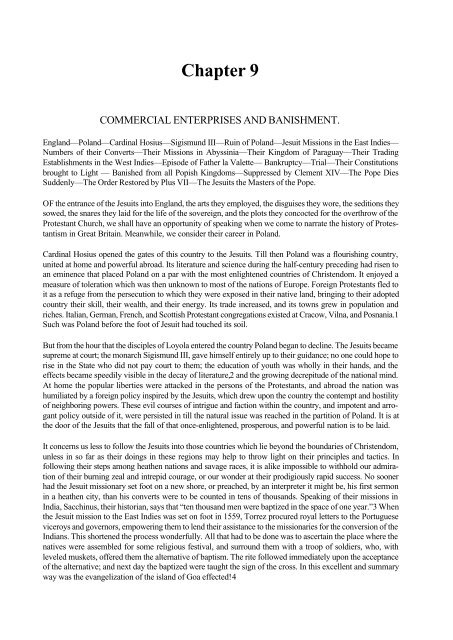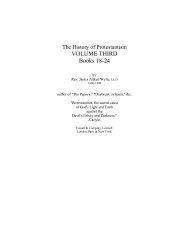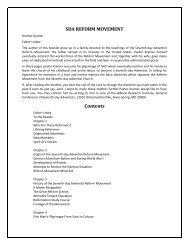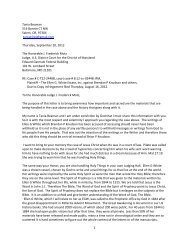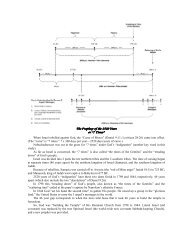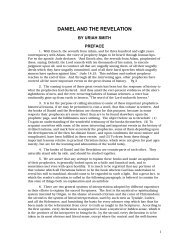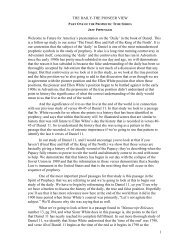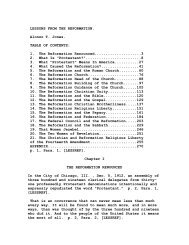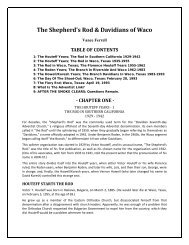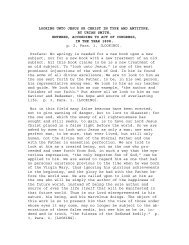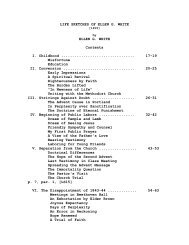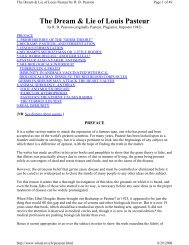History of Jesuits
History of Jesuits
History of Jesuits
Create successful ePaper yourself
Turn your PDF publications into a flip-book with our unique Google optimized e-Paper software.
Chapter 9<br />
COMMERCIAL ENTERPRISES AND BANISHMENT.<br />
England—Poland—Cardinal Hosius—Sigismund III—Ruin <strong>of</strong> Poland—Jesuit Missions in the East Indies—<br />
Numbers <strong>of</strong> their Converts—Their Missions in Abyssinia—Their Kingdom <strong>of</strong> Paraguay—Their Trading<br />
Establishments in the West Indies—Episode <strong>of</strong> Father la Valette— Bankruptcy—Trial—Their Constitutions<br />
brought to Light — Banished from all Popish Kingdoms—Suppressed by Clement XIV—The Pope Dies<br />
Suddenly—The Order Restored by Plus VII—The <strong>Jesuits</strong> the Masters <strong>of</strong> the Pope.<br />
OF the entrance <strong>of</strong> the <strong>Jesuits</strong> into England, the arts they employed, the disguises they wore, the seditions they<br />
sowed, the snares they laid for the life <strong>of</strong> the sovereign, and the plots they concocted for the overthrow <strong>of</strong> the<br />
Protestant Church, we shall have an opportunity <strong>of</strong> speaking when we come to narrate the history <strong>of</strong> Protestantism<br />
in Great Britain. Meanwhile, we consider their career in Poland.<br />
Cardinal Hosius opened the gates <strong>of</strong> this country to the <strong>Jesuits</strong>. Till then Poland was a flourishing country,<br />
united at home and powerful abroad. Its literature and science during the half-century preceding had risen to<br />
an eminence that placed Poland on a par with the most enlightened countries <strong>of</strong> Christendom. It enjoyed a<br />
measure <strong>of</strong> toleration which was then unknown to most <strong>of</strong> the nations <strong>of</strong> Europe. Foreign Protestants fled to<br />
it as a refuge from the persecution to which they were exposed in their native land, bringing to their adopted<br />
country their skill, their wealth, and their energy. Its trade increased, and its towns grew in population and<br />
riches. Italian, German, French, and Scottish Protestant congregations existed at Cracow, Vilna, and Posnania.1<br />
Such was Poland before the foot <strong>of</strong> Jesuit had touched its soil.<br />
But from the hour that the disciples <strong>of</strong> Loyola entered the country Poland began to decline. The <strong>Jesuits</strong> became<br />
supreme at court; the monarch Sigismund III, gave himself entirely up to their guidance; no one could hope to<br />
rise in the State who did not pay court to them; the education <strong>of</strong> youth was wholly in their hands, and the<br />
effects became speedily visible in the decay <strong>of</strong> literature,2 and the growing decrepitude <strong>of</strong> the national mind.<br />
At home the popular liberties were attacked in the persons <strong>of</strong> the Protestants, and abroad the nation was<br />
humiliated by a foreign policy inspired by the <strong>Jesuits</strong>, which drew upon the country the contempt and hostility<br />
<strong>of</strong> neighboring powers. These evil courses <strong>of</strong> intrigue and faction within the country, and impotent and arrogant<br />
policy outside <strong>of</strong> it, were persisted in till the natural issue was reached in the partition <strong>of</strong> Poland. It is at<br />
the door <strong>of</strong> the <strong>Jesuits</strong> that the fall <strong>of</strong> that once-enlightened, prosperous, and powerful nation is to be laid.<br />
It concerns us less to follow the <strong>Jesuits</strong> into those countries which lie beyond the boundaries <strong>of</strong> Christendom,<br />
unless in so far as their doings in these regions may help to throw light on their principles and tactics. In<br />
following their steps among heathen nations and savage races, it is alike impossible to withhold our admiration<br />
<strong>of</strong> their burning zeal and intrepid courage, or our wonder at their prodigiously rapid success. No sooner<br />
had the Jesuit missionary set foot on a new shore, or preached, by an interpreter it might be, his first sermon<br />
in a heathen city, than his converts were to be counted in tens <strong>of</strong> thousands. Speaking <strong>of</strong> their missions in<br />
India, Sacchinus, their historian, says that “ten thousand men were baptized in the space <strong>of</strong> one year.”3 When<br />
the Jesuit mission to the East Indies was set on foot in 1559, Torrez procured royal letters to the Portuguese<br />
viceroys and governors, empowering them to lend their assistance to the missionaries for the conversion <strong>of</strong> the<br />
Indians. This shortened the process wonderfully. All that had to be done was to ascertain the place where the<br />
natives were assembled for some religious festival, and surround them with a troop <strong>of</strong> soldiers, who, with<br />
leveled muskets, <strong>of</strong>fered them the alternative <strong>of</strong> baptism. The rite followed immediately upon the acceptance<br />
<strong>of</strong> the alternative; and next day the baptized were taught the sign <strong>of</strong> the cross. In this excellent and summary<br />
way was the evangelization <strong>of</strong> the island <strong>of</strong> Goa effected!4


